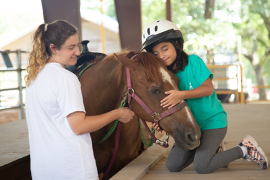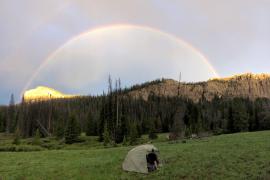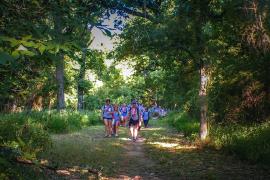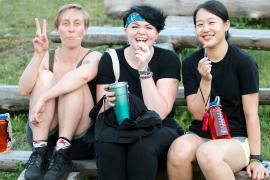Now that it is camp staff recruiting season again, I find that in-person job fairs can be overwhelming. Contributing factors can be familiarity with the university, travel to get to campus, and self-doubt that arises when most of the recruiters and attendees are wearing suits — and I’m wearing a camp hoodie.
While my success rate varies from university to university and season to season, I believe in the process and do my best to visit several campuses each recruiting season.
It is never too early to plan an on-campus visit. Consider these suggestions as you prepare for the big day:
Which university departments and clubs can you reach out to? Let them know when you plan to visit and ask if they welcome job recruiters as guest speakers. Building a relationship with faculty and staff members can provide a pipeline of access to future camp staff. If the professor does not have time for you to visit their class, invite them to meet you at the fair. Suggest they incentivize students in their classes to attend the fair.
Share these Project Real Job resources with the fair organizers and other university connections:
- There is a camp out there for you
- Find Your Summer Camp dream job
- 10 reasons to Work at Camp (and why it’s a real job)
- Questions to ask a camp employer.
Does your camp have alumni who are students or staff members at the university? Ask them to spread the word about your visit. Send them marketing materials and swag to share with their friends or colleagues. Plan to meet them before the fair for a meal and tell them to bring a friend.
How are you using your camp’s social networks to promote your visit? Ask the people organizing the fair if they have a designated hashtag you can use. Find out if there are other ways to reach specific groups of students such as contacting the Outdoor Rec Club.
Can you arrive at the university the day before the job fair? If so, consider hosting a panel discussion with students who can promote their experience working at camp. The panel can feature students who have worked at several camps. Ask the job fair coordinator if other camps are attending, create a working group, and leverage each other’s networks to attract attention to the event. If you have any applicants, meet them before the fair, encourage them to attend the panel, and help spread the word about the event.
How do you market your camp’s participation in the event? It is important to produce engaging marketing materials to display at the fair such as an eye-catching marketing display banner. Postcards or business cards with QR codes are an effective tool to share more in-depth information without overwhelming attendees with a lot of paper.
How can you gather basic information from fair attendees? Create a short Google form and link to a QR code and ask anyone you speak with to share whatever information they are comfortable giving you. Then, follow up the next day by asking for a video or phone call to share more details about job opportunities.
How will you measure success? Be realistic about the process. Building a network might take two to three visits; in some years, you might not find people who match your program’s needs.
As someone who is dedicated to on campus recruiting, the most important advice I can give is to make a commitment to cultivating relationships at whatever universities you visit. People need to trust that we are worthy partners who will provide their students with meaningful work. The more time you put in, the more likely professors, coaches, and others will advocate on you and your camp’s behalf.
This blog was written on behalf of ACA's Project Real Job, whose goal is to support camps in their efforts to recruit, hire, and retain staff.
Dave Schiff and Julie Knapp are members of the ACA Staff Recruitment and Retention Committee. Dave is the co-owner of Camp Manitou in Oakland, Maine. Dave also chairs the Maine Summer Camps ad-hoc Staffing Committee. He can be reached at [email protected]. Julie is a clinical assistant professor, internship coordinator, and career advisor for the Department of Health & Wellness Design. She is also the director for the Indiana University Executive Development Program for Park and Recreation Professionals at the School of Public Health-Bloomington. Julie can be contacted at [email protected].
Photo courtesy of Black River Farm and Ranch in Croswell, MI
The views and opinions expressed by contributors are their own and do not necessarily reflect the views of the American Camp Association or ACA employees.




